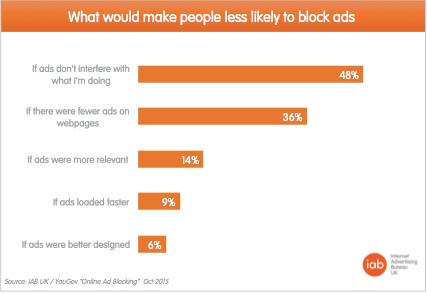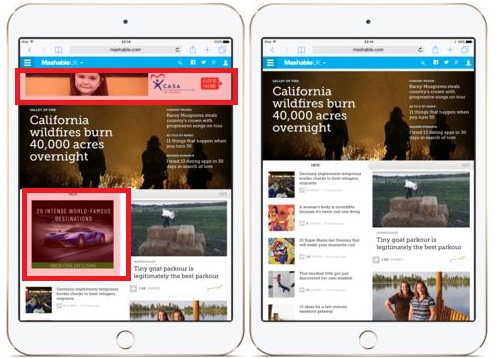Ad blockers have long been a niche concern to digital marketers, but in 2015 they became one of the biggest threats to the industry. As part of our review of the year we look back at the key trends in digital advertising, including the rise of retargeting, programatic’s viewability problem and the big data revolution.

With Android and iPhone users given the power to block ads on their mobiles, some Western markets are seeing 1 in 5 web users adopting ad blocking software. The practice is forecast to cost billions in lost revenue in the coming year- but how does the industry respond? Yahoo blocked users and YouTube bypassed the filters while Facebook and Apple built up their ‘walled gardens’ of content. But is the real solution consumer education, branded content and increased personalisation?
Key trends to check your 2016 plans against:
• Retargeting revolution: Following users around the web gets better ROI than search and email
• Programatic paradox: More automated ads served than ever, but less are actually seen
• Rise of the chief data officer: Data takes a seat at the top table
• Big players cull agencies: P&G drops external teams by 40% to focus on digital
Yahoo Mail shuts out customers with ad block enabled
In a controversial move, Yahoo is preventing some people from accessing their email if they are using ad-blocking software in their browser.

The rise of the Chief Data Officer: Now directly reporting to the CEO
With a flood of consumer data now available to brands, there has emerged a new role: the Chief Data Officer (CDO). New research looks at how businesses are transforming their decision making processes, with big data at the centre.

Ad blocking rises 3 percentage points in three months
Nearly one fifth (18%) of British adults online are currently using ad blocking software, signalling a rise from 15% in early June, according to new data.

Advertisers ‘can pay to bypass ad blocker’
The developers of popular ad blockers are letting some ads through to consumers… for a fee, according to a news report.

Global ad spend trends for 2016: Programmatic starts to dominate ad buying
By the end of 2015 in the US Programmatic transactions will account for 52% of non-search digital advertising spend, with growth set for 20% a year, according to new research.

P&G cuts agencies by 40% in efficiency drive
Procter & Gamble is reducing the number of agencies it works with globally in PR, advertising and marketing, as the FMCG giant looks to improve spending efficiency across the business.

Is programmatic to blame for falling ad viewability?
A new report has put doubt on the benefits of programmatic ad buying, showing that UK ad viewability has fallen below 50%, behind other key EU countries.

Ad retargeting ‘performs better than search or email’ (infographic)
Retargeting has grown in popularity as marketers use consumers’ previous Internet actions to encourage them to make a previously abandoned sale. New research suggests the practice is becoming more effective than search and email in winning conversions.

The best and worst subject line words: ‘Offer’ good, ‘Monday’ bad
When it comes to email subject lines, words such as ‘content’, ‘offer’ and ‘benefits’ increase email open rates, ‘Friday’ , ‘Monday’, and ‘double’ could actually harm performance, according to new research.

Google admits ‘more than half its ads are never seen’
Most display ads are not seen by anyone on the web, apart from bots, according to new research from Google.

